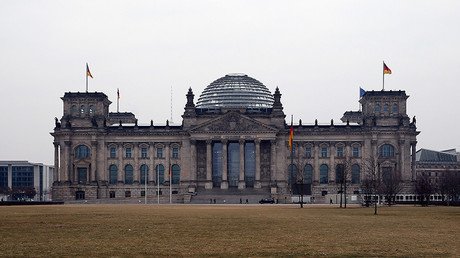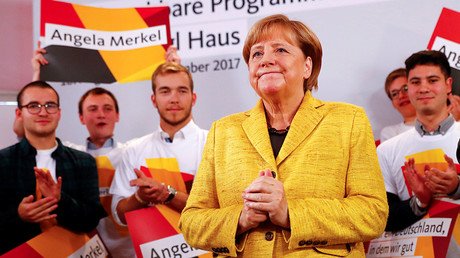German electoral system oddities: What you need to know about it
German democracy lies on a quite complicated electoral system, which does not produce a clear winner, but leaves voters wondering about the possible coalition options. RT has put together a quick guide to help you better understand the system.
FOLLOW RT's LIVE UPDATES: German elections: Will Merkel win 4th term as chancellor?
Germans are heading to the polling stations on Sunday to cast their votes for members of parliament, who will occupy at least 598 seats in Bundestag for the next four years. The results will determine whether incumbent Angela Merkel will remain chancellor amid the migrant crisis in Germany and across Europe.
Complex arithmetic
Parties must gain a minimum of five percent of the proportional vote or win at least three constituency seats to get into parliament, which will have 598 members. However, due to Germany’s complex electoral system, there are 631 members in the current Bundestag, and there were 622 members after the previous election.
At the polls, each person is asked to cast not one, but two votes: the first for a constituency representative, the other for their preferred political party. There are 299 constituencies that form 16 federal states.
In the first vote, people in each of the 299 constituencies directly choose their representative in the federal parliament. The second vote includes party lists in 16 federal states and defines the general share of the parties’ proportion in German Bundestag.
This is where the complex arithmetic starts. First, the number of Bundestag seats gained by a party in each of 16 federal states is calculated based on the proportion of votes a party received in the second vote. At the same time, a party can gain more candidates to be sent to parliament from a federal state, as its individual candidates can win in more constituencies than their proportional share gained in the second vote allows.
Depending on which figure is higher – the number of seats gained by a party list in a federal state or the number of individual candidates who won in the constituencies of that federal state – the party receives a minimum number of seats in that federal state. Added together in the 16 federal states, it defines the minimum number of seats a party is guaranteed in Bundestag.
This is how parliament’s size may vary, as each party can receive so-called ‘overhang seats’ that do not match the general share it received in the second vote. This loophole gave Markel’s party, the Christian Democratic Union (CDU), 21 more representatives back in 2009, as its candidates won in most of the districts.
To avoid giving such an advantage to a single party, now if it has more than 15 overhang seats, additional ‘balance seats’ are distributed among all the parties that overcame the necessary threshold.
This means that the Bundestag could theoretically grow to 800 members, according to Spiegel. This election may bring up to 700 members to the Bundestag, according to German political scientist Joachim Behnke.
Coalition mystery
The complex system prevents a single party from winning an overwhelming majority. Unlike in the US, France, and many other countries, where an election usually produces a clear winner, even once the German results are in, there is still the question of how the parties will build a coalition.
Handy guide to German coalition names via Politico. This is about to be relevant. pic.twitter.com/3PH2rFvwrm
— Marcel Dirsus (@marceldirsus) 20 сентября 2017 г.
Polls put Angela Merkel’s party, the CDU, and its sister party – the Christian Social Union (CSU) – well out in front, with around 36 percent of the votes. Martin Schulz’s Social Democrats (SDU) are projected to come in second, with 21 percent of the votes. The third leader is not so clear, as anti-migrant party Alternative for Germany (AfD), left-wing Die Linke, the Greens, and the Free Democrats (FDP) are neck in neck in the run-up to the election.
Let’s take a brief look at the coalition possibilities.
A ‘Grand coalition’ between Merkel’s party and Martin Schultz’s Social Democrats may occur. However, the SDU leader might not agree to play second fiddle.
“I’m aiming to become chancellor,” Schulz said at a press conference in Berlin earlier in September. “If Mrs. Merkel wants to join my cabinet, she can do so as my vice chancellor.”
Christian Lindner, the leader of the Free Democrats, a liberal pro-business party, could be another option for Merkel, as he has teamed up with the current chancellor and her allies before. However, he may confront Merkel on some key issues, including the sensitive migrant issue.
“If peace prevails, refugees must return,” he said to Bild in September. “There is no such human right for choosing your place in the world.”
Even with Lindner’s support, Merkel might still need extra help to get a majority in Bundestag. Thus, the Greens could come into the fold, with their top candidate dubbed the ‘Green Angela’ for her similarities with Merkel.
The CDU, the FDP, and the Greens would make for an exotic mix, commonly known as the ‘Jamaica Coalition,’ which has never made it to the national government before.
It may take weeks to form a coalition and even more to form the government, so you should not expect a clear picture the day after the election.














